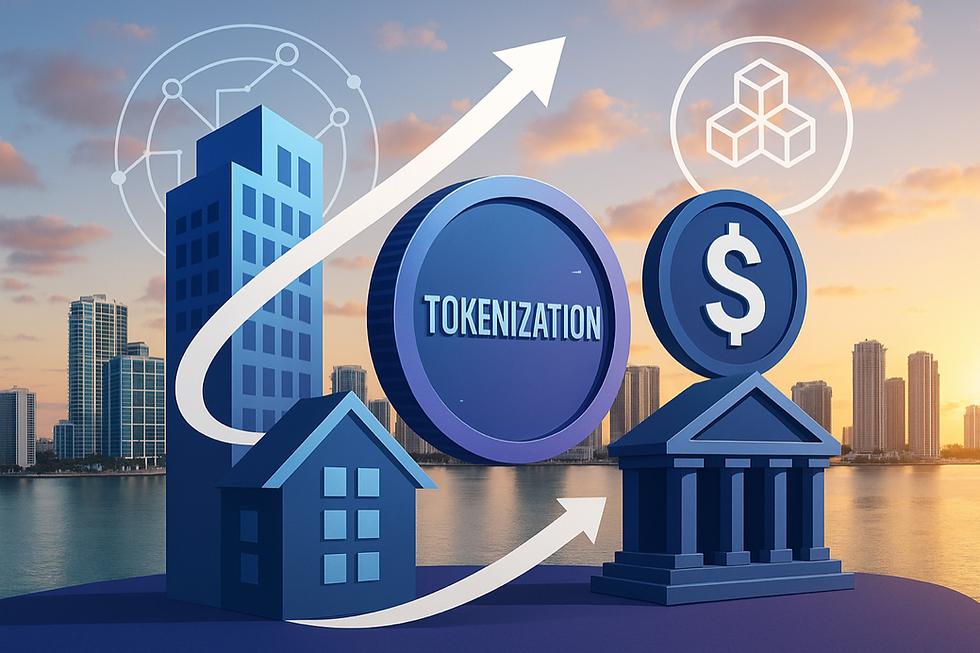Why Bitcoin Will Disrupt Real Estate: A New Era in Property Investment
- Meggen Harris

- Jul 22, 2025
- 5 min read
Updated: Aug 27, 2025

Bitcoin's rapid rise has already reshaped numerous industries, from finance to digital art. Now, it is set to disrupt real estate in ways that many may not have anticipated. The core properties of Bitcoin—its decentralized nature, limited supply, and inherent resistance to inflation—make it a compelling alternative to traditional investment vehicles like real estate. In recent discussions, key opinion leaders (KOLs) in the space have begun pointing out how Bitcoin could revolutionize property markets worldwide. The recent article from Bitcoin Magazine entitled "Bitcoin is Draining the Value Out of Real Estate" further highlights these shifts, showing how digital assets are draining liquidity from traditional markets and reshaping investor behavior.
Bitcoin’s Impact on Traditional Real Estate Markets
Bitcoin’s volatility and decentralized nature have made it a controversial asset, but it is increasingly viewed as a hedge against inflation and a store of value. As a result, the asset class has drawn the attention of real estate investors looking for safer and more liquid ways to preserve and grow their wealth.
Real Estate and the Fight for Liquidity
The real estate market has long been known for its illiquidity. Properties take months or even years to buy and sell, requiring complex contracts and intermediaries like brokers, title companies, and banks. Bitcoin, on the other hand, offers a liquidity that real estate simply cannot compete with. In the Bitcoin Magazine article, it is pointed out that "Bitcoin is draining the value out of real estate" by giving investors a more liquid alternative.
For years, institutional and individual investors have parked their wealth in real estate as a "safe" investment. However, Bitcoin, with its unique financial characteristics, offers a way out. The ability to quickly convert Bitcoin into fiat currency and vice versa has made it an appealing choice for those who seek flexibility. Real estate, with its long settlement periods, has become less attractive in comparison.
Bitcoin’s Store of Value Role
As the U.S. dollar and other fiat currencies continue to experience inflationary pressures, Bitcoin has emerged as a digital alternative that holds its value over time. Its decentralized nature means it is not subject to the whims of central banks, and its capped supply—only 21 million coins—ensures that its value cannot be diluted by government printing.
In the context of real estate, Bitcoin’s role as a store of value is beginning to disrupt traditional property markets. Rather than pouring money into physical assets like homes or commercial properties, investors are increasingly choosing Bitcoin for its long-term wealth preservation potential. In fact, some high-net-worth individuals have already shifted significant portions of their portfolios away from real estate in favor of Bitcoin.
The Demographic Shift Toward Bitcoin Investment
While many traditional real estate investors are hesitant to move into the cryptocurrency space, younger generations—particularly millennials and Gen Z—are increasingly looking toward Bitcoin and other digital assets as their preferred investment vehicles.
Generational Attitudes Towards Investment
The millennial and Gen Z generations are digital natives who grew up with the internet and a distrust of traditional financial institutions. Real estate, while a secure investment historically, has proven to be less accessible to these younger individuals due to skyrocketing prices in urban areas and increasingly stringent lending practices.
Bitcoin, however, allows these younger investors to bypass the traditional barriers to entry, such as securing a mortgage or saving for a large down payment. With Bitcoin, anyone can buy a fraction of a coin and begin investing with as little as $1. This newfound access to high-value investment assets is shifting attention away from physical property and into digital currencies.
KOL Insights on the Future of Real Estate
Prominent figures in the Bitcoin and cryptocurrency space are voicing concerns about how Bitcoin’s increasing popularity will continue to drain value from real estate. In a recent commentary, Michael Saylor, CEO of MicroStrategy, emphasized that Bitcoin is becoming the primary store of wealth for a new generation of investors. He remarked that “The future of wealth management will increasingly be driven by digital assets, and real estate will need to adapt to this trend.”
On the other hand, Bitcoin educator and investor, Dan Held, recently discussed how real estate’s status as a store of value is being undermined by the emergence of decentralized digital money. In an insightful Twitter thread, Held pointed out that real estate prices have largely outpaced wage growth, making it harder for middle-class families to participate in property ownership. Bitcoin offers a unique opportunity to combat this trend by offering an asset that is universally accessible and inflation resistant.
Real Estate Tokenization: The Way Forward?
One of the key developments that could further accelerate Bitcoin’s disruption of real estate is the concept of real estate tokenization. This involves creating digital tokens that represent ownership shares in physical real estate assets. By leveraging blockchain technology, tokenization allows fractional ownership of high-value properties, enabling smaller investors to participate in real estate markets without the heavy upfront costs.
Bitcoin’s underlying technology, the blockchain, is integral to this process. Through smart contracts and decentralized finance (DeFi) protocols, tokenized real estate allows buyers and sellers to transact without relying on traditional intermediaries like banks. The process is faster, cheaper, and more transparent, further solidifying Bitcoin’s role as a disruptor in the property investment space.
The Future of Real Estate in the Bitcoin Era
The real estate sector is undoubtedly undergoing a profound transformation as Bitcoin continues to gain traction. As liquidity flows away from traditional property markets, investors are rethinking the value proposition of physical assets. Bitcoin’s low barrier to entry, high liquidity, and potential for long-term wealth preservation are positioning it as the investment of choice for a growing number of people.
Furthermore, as real estate tokenization becomes more widespread, Bitcoin could further diminish the need for conventional property ownership. Investors may no longer need to buy entire properties to benefit from the value appreciation of real estate. Instead, they could simply hold tokens that reflect their share of a real estate portfolio, all while using Bitcoin as the medium of exchange.
Conclusion: Embrace the Change or Get Left Behind?
As we move further into the digital age, Bitcoin’s ability to disrupt traditional industries like real estate will only become more pronounced. Investors who are able to recognize the potential of Bitcoin and its role in future property markets will be at a distinct advantage. On the other hand, those who cling to outdated models of wealth management may find themselves left behind.
Bitcoin is not just a passing trend—it is a fundamental shift in how we think about money, investment, and value. While real estate may remain a staple of investment portfolios for some time, the rise of Bitcoin signals that we are entering a new era, one where digital currency will play an increasingly dominant role in shaping the future of wealth.
Want more insights like these? Connect with us for personalized investment strategies tailored to your financial goals.
References:
Bitcoin Magazine, "Bitcoin is Draining the Value Out of Real Estate"
Michael Saylor, CEO of MicroStrategy, statements on digital assets.
Dan Held, Bitcoin educator and investor, Twitter thread on real estate and digital currencies.
Disclaimer: This blog post is for informational purposes only and does not constitute an offer to sell or a solicitation of an offer to buy any securities. Investment opportunities referenced herein are intended solely for accredited investors and may be offered only through appropriate offering documents. Past performance is not indicative of future results. Investing involves risk, including the possible loss of principal. Participant Capital does not provide tax or legal advice; individuals should consult their own advisors to understand the potential tax consequences. Views expressed are those of the authors and do not necessarily reflect the official views of Participant Capital or its affiliates.




This article makes a compelling case for how Bitcoin is reshaping
real estate investment. By offering liquidity, fractional ownership, and protection against inflation, it’s clear that younger investors are increasingly drawn to digital assets over traditional property. For anyone exploring property opportunities, understanding this shift is essential—embracing tokenization and cryptocurrency could redefine your investment strategy in the coming years.This article makes a compelling case for how Bitcoin is reshaping real estate investment. By offering liquidity, fractional ownership, and protection against inflation, it’s clear that younger investors are increasingly drawn to digital assets over traditional property. For anyone exploring property opportunities, understanding this shift is essential—embracing tokenization and cryptocurrency could redefine your investment strategy in the coming years.